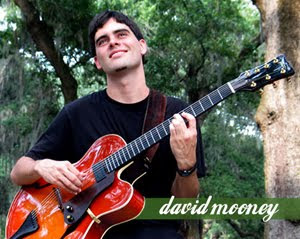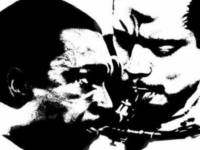When musicians get together for jam sessions at a restaurant or a music house after the marquee gigs are done, that’s called a “late set.” It’s been a part of the NYC jazz scene at least since guys like Charlie Christian, Thelonius Monk, Kenny “Klook” Clarke, Charlie Parker and Dizzy Gillespie invented be-bop at Minton’s in the early 1940’s. Today there are scores of jazz musicians who are music students and teachers by day trying to hone their craft and earn notice as musicians at night. Steadfastly refusing to trade in their integrity for a real shot at a major label contract, they toil in relative obscurity knowing that many of the most respected legends of the genres got their lofty status by persistence, hard work and dedication to the craft, too.
Recently, a record company was set up to give these up-and-coming talents recording opportunities to help get their music out to listeners far beyond the nightclubs of New York. LateSet Records, a new-created subsidiary of Tokyo-based Spice Records, found four of these capable musicians and last month, released their first four CD’s, one by each of these artists (the albums have been previously released in Japan). This installment of Quickies is devoted to taking a look of LateSet’s debut releases, and the jazzers that are earning their stripes the right way.
There’s a definite pattern about these first LateSet signees: they are all guitarists. The other main similarity is that their jazz has some distinction and is challenging, even as it’s also quite tuneful. They’re beyond trying to copy others and are molding their own sonic imprint. The abilities as performers, composers and interpreters are already evident; you should be hearing more from these prospects in the future. So why not hear about them now?
 Gilad Hekselman Words Unpsoken
Gilad Hekselman Words Unpsoken
Gilad Hekselman is following a growing line of Israeli jazz musicians making an impressionable mark on the NY scene, like Avishai Cohen (bass), Avishai Cohen (trumpet), Amos Hoffman, Anat Cohen and Ayelet Rose Gottlieb-Levavi. He arrived in the Big Apple just five years ago and in 2006 released his debut album Splitlife. His impressionistic guitar style recalls the cool-toned approach of Jim Hall and the fluidity of one John Abercrombie. His chops were good enough to win him the Gibson Montreaux International Guitar Competition in 2005.
For his sophomore album Word Unspoken, Hekselman utilizes prestigious help in Joe Martin (bass), Marcus Gilmore (drums), and on four tracks, Joel Frahm (tenor sax), musicians who have all recently gotten shout-outs here. All provide excellent support, especially Gilmore. As with all the other LateSet offerings, this record is a judicious blend of original and standards. He shows quietly proficient technique throughout but it’s especially fun to hear it on mid-to-fast tempo tunes like his “New York Angels” and John Coltrane’s “Countdown.” Despite his nationality Hekselman doesn’t try to create world fusion with a Mid-Eastern flavor, although his concluding track “Will The Song Ever End?” reveals an ability to craft a beautifully melancholy song that apparently comes more from Jewish tradition than the jazz tradition. Words Unpsoken speaks volumes about this young man’s talent and potential.
Of these four guitarists, Peter Mazza’s style is probably the least subtle, but it’s no less nuanced. He relishes robust chordal expressions and harmonics that blur the lines between jazz, folk, new age and rock. His clean and sophisticated lines attest to a jazz pedigree, however. With music degrees from the Manhattan School of Music and Julliard, he worked hard to obtain his advanced technique, but his flair for vivid compositions and arrangements of standards adds something more to the prestigious conservatory background.
At least, that’s what I take away from his Through My Eyes CD. There’s a certain breezy energy to his playing that somehow maintains that energy without having to stuff gobs of notes into each chord. Backed by Bill Campbell (drums), Mat Penman (acoustic bass) and Will Vinson (saxes), Mazza takes this traditional jazz quartet setup and weaves some very contemporary sounding music out of it. Choosing from a large arsenal of electric, acoustic and baritone guitars, Mazza finds the right axe for the right mood. His songs each possess distinct character, like the lightnng fast bop lines of “Burned,” to the deeply mellifluous “Close To My Heart, the tender acoustic ballad “Goodbye,” and the shuffling funk of “Alphabet City.” Throw in a couple of Vinson/Mazza duets with a fresh take on some old covers (“My Funny Valentine,” “One Green Dolphin Street”) and you’ve got a guitar album that sounds good no matter if you’re listening closely or not.
Amanda Monaco I Think I”ll Keep You
Ama
nda Monaco has been teaching guitar for nearly twenty years, but her own performances are probably her best clinics. She is very much traditionally-bound, and yet she has a strong adventurous streak that sometimes pushes her toward free-jazz territory. She is comfortable in a wide variety of settings, leading quartets and quintets, while also performing in big bands and jazz chambers groups. One of her main projects of late is her quartet, and it’s with this group that she used to record I Think I’ll Keep You.
Monaco uses virtually the same band configuration as does Mazza, but the resulting sound is more identifiable as jazz. However, like Mazza, she can mix it up. There’s a lightly swinging waltz of the title song, the tango taste of “Slinky,” the abrasive free form of “Hckhh Blues,” or the advanced bop of “It’s Like This, See…” Some no-nonsense renditions of classics like “Jitterbug Waltz” and Darn That Dream” are thrown in for good measure. As a bandleader, Monaco is quite generous to the space she allots her bandmotes, and Attias gets plenty of time in the spotlight. Monaco herself is mostly played a warm, unfussy style that swings as confidently as Kenny Burrell’s. I Think I’ll Keep You runs cool more than it does hot, but when cool is called for, this one is well worth absorbing.
Davy Mooney hails from the Crescent City, our kind of town, and attended the well-regarded music program over at the University of North Texas. Now he’s up in NYC and like the other three plectrists in this piece, and is looking to stand out there. What stands out right away about Mooney is that he’s not a six-string specialist…he plays a seven-string guitar instead. It gives him a little fuller and richer sound. But fear not, Mooney doesn’t believe that more strings means cramming in more notes, he’s too tasteful to fall into that trap.
Mooney quickly follows up his guitar duo album with John Pizzarelli (Last Train Home (2009)) with Astoriano, a collection of nine originals and two covers. Mooney leads a cohesive base trio of himself, bassist Matt Clohesy and drummer Simon Lott, and adds in sax player John Ellis and organist Brian Coogan on select tracks. The songs all fall within the realm of post-bop with some light Brazilian touches here and there, but with interesting chord progressions and guys are given ample room to stretch. The arrangements are pretty good, too: John Coltrane’s “Countdown” (evidently a popular cover amongst the LateSet crowd) is revitalized by a samba beat and some fantastic groovin’ between Mooney and Clohesy. While the mood varies from song to song, Mooney and his crew maintains a strong sense of swing. With the fundamentals as a performer, composer and bandleader already down pat on Astoriano, the sky’s the limit for Davy Mooney.
- Ches Smith Quartet – ‘Clone Row’ (2025) - May 30, 2025
- James Brandon Lewis Quartet – ‘Abstraction Is Deliverance’ (2025) - May 27, 2025
- Soft Machine – ‘Drop’ (1971, 2025 remaster) - May 21, 2025







